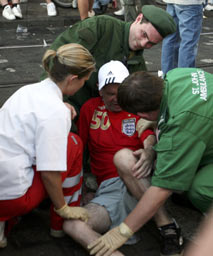
German
medical staff takes care of an English soccer fan in Frankfurt after the
group B FIFA World Cup 2006 soccer match between England and Paraguay June
10, 2006. [Reuters] |
From Mogadishu to Kabul to Baghdad, watching the World Cup is proving to be
bad for your health.
Sometimes it's fatal.
Hardline Islamic courts in the Somali capital have banned people from
watching the action in Germany on television believing it to be against Muslim
teaching.
In a brief but violent protest, two people were killed as gunmen, reportedly
allied to the Joint Islamic Courts, forced three cinema halls to shut and warned
football lovers against watching the matches which were being relayed through
satellite.
"The Islamic courts have ordered the closure of three cinema halls," said
Sukahola resident Abdulaziz Hanad.
"They want to make sure that nobody in Mogadishu watches the World Cup."
In war-torn Baghdad, many Iraqis feared they would miss out on the spectacle
as the country's public broadcaster had no retransmission rights and the cost of
subscriptions are beyond the means of many.
"I can't buy a decoder for the Arab channel that is showing all the matches,"
said student Mustafa Abdel Sattar.
For 175 dollars (135 euros), subscribers receive a special package that
includes all 64 matches broadcast by the ART channel.
In Afghanistan, the 10,000-strong NATO force can watch the games on
cinema-style screens at the the International Security Assistance Force
headquarters (ISAF) in Kabul.
German soldiers were to first to test-run the facility by watching their
team's 4-2 win over Costa Rica on Friday 5,000 kilometres (3,000 miles) from
where the match was being played in Munich.
They were some of the 200 NATO soldiers -- German, French, British,
Macedonian, Turkish and Swiss -- who gathered in the Wolves' Den bar in Camp
Warehouse to watch a live transmission of the match.
It's a scenario which would have been impossible five years ago when the
Taliban banned television and initially outlawed football.
They relented, but insisted that players wore trousers and sleeves and
ordered them to stop for prayers during matches.
Supporters were forbidden to cheer.
On Indonesia's Java island, where 5,800 people died in May's earthquake,
locals were also trying to get access to World Cup television coverage.
Football fan Faturohman said the prospect of missing out on the tournament
would be painful.
"I'm ruined. The electricity in this area is only enough for lights. We can't
watch TV and besides that, my set was flattened by rubble from my house," said
the 19-year-old whose favourite player is England striker Michael Owen.
"People in this area really love to watch soccer. Watching the World Cup
would be entertainment for us while we are still grieving from the earthquake."
Elsewhere, there are other dangers.
Three Kenyans, hoisting a television antenna to watch the World Cup, were
electrocuted and nearly killed when they accidentally hit a high-voltage power
line in Nairobi.